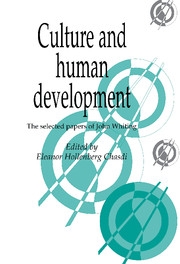Book contents
- Frontmatter
- Contents
- List of figures
- Preface
- Acknowledgments
- Introduction: John Whiting and anthropology
- Fifty years as a behavioral scientist: autobiographical notes
- Part I Theory and methods
- Part II Environment and history
- Introduction
- 4 Environmental constraints on infant care practices
- 5 The learning of values
- Part III Moral development
- Part IV Gender development
- Part V Development of social behavior
- Bibliography
- Complete bibliography of John W. M. Whiting's work
- Index
5 - The learning of values
Published online by Cambridge University Press: 23 December 2009
- Frontmatter
- Contents
- List of figures
- Preface
- Acknowledgments
- Introduction: John Whiting and anthropology
- Fifty years as a behavioral scientist: autobiographical notes
- Part I Theory and methods
- Part II Environment and history
- Introduction
- 4 Environmental constraints on infant care practices
- 5 The learning of values
- Part III Moral development
- Part IV Gender development
- Part V Development of social behavior
- Bibliography
- Complete bibliography of John W. M. Whiting's work
- Index
Summary
Certain dominant values of a culture influence the way in which a parent responds to her child. If love and warmth are an important positive value for social interaction, this may govern a mother's behavior toward her child, even though at the same time she may believe she is spoiling him. In those societies where parents believe that their own actions, rather than fate or heredity, have some effect upon the moral development of their children, the value system of the culture will be an important part of what is consciously and intentionally transmitted to the child. Certain aspects of the child-rearing process seem to have the effect of, if not creating, at least strengthening values far beyond the conscious intent of the agents of socialization.
In the summers of 1950 and 1951, research teams from the Laboratory of Human Development of the Harvard Graduate School of Education carried out a research project focusing on socialization in three of the groups under consideration in this volume – the Texans, the Mormons, and the Zuni. The fieldwork consisted of ethnographic and standardized interviews, participant observation, and various pencil and paper tests given to a sample of children in each society. The sample, consisting of all the children in the third through the sixth grades in the Mormon and Texan communities, and from the fourth, fifth, and sixth grades of the Zuni Country Day School, is described in table 6.
All the mothers of the children tested in the two Anglo groups were interviewed on their child-rearing practices.
- Type
- Chapter
- Information
- Culture and Human DevelopmentThe Selected Papers of John Whiting, pp. 135 - 170Publisher: Cambridge University PressPrint publication year: 1993
- 1
- Cited by

